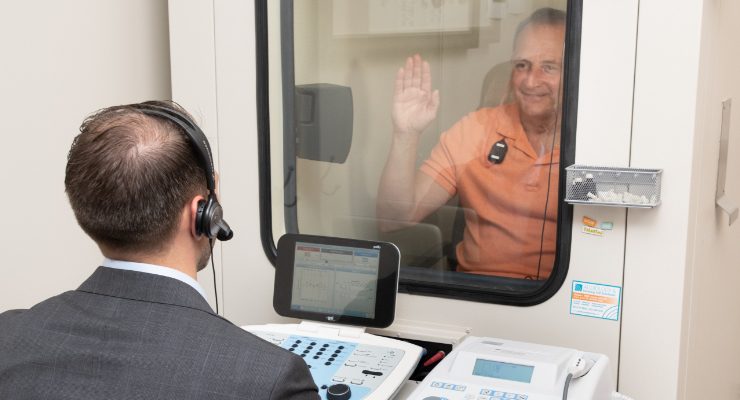
Audiologist collaborates with other health care professionals on correlation between hearing loss and falling among seniors
Older adults are more likely to suffer falls — but could hearing loss be a culprit in such incidents? Because balance and hearing are directly connected, sharing a common nerve pathway to the brain, ensuring the proper auditory support for older adults can help prevent falling incidents.
In fact, every seven minutes, another New Jersey resident over age 60 falls, according to state figures. Daily, this results in more than 200 emergency room visits and annually, at least 400 deaths in the Garden State.
Even more concerning, the correlation between falling and hearing loss is significant. Even a mild degree of hearing loss triples the risk of an accidental fall, with the risk increasing by 140% for every additional 10 decibels of hearing loss.
Fortunately, the experienced team of audiologists at northern New Jersey’s Audiology & Hearing Aid Solutions, with several convenient northern New Jersey locations, is trained in diagnosing and treating hearing and balance disorders — which can play a significant role in addressing the correlation between hearing loss and falls.
Dr. Pat Biondi, Au.D., audiologist and owner of Audiology & Hearing Aid Solutions, noted that addressing hearing loss and its impact on balance and spatial awareness can contribute to reducing the risk of falls and improving patients’ overall quality of life. Areas in which Dr. Biondi and his team can assist patients include:
Balance and Dizziness Assessment: Audiologists can perform assessments to evaluate balance and dizziness issues, as the inner ear (vestibular system) plays a role in both hearing and balance.
Collaboration: Dr. Biondi and his colleagues will explain to patients and family members how collaboration with other health care professionals, such as physicians, physical therapists, and occupational therapists, can ensure comprehensive care for individuals at risk of falls due to hearing loss.
Custom Lifestyle Solutions: Dr. Biondi will also explain how the experienced audiology professionals at Audiology & Hearing Aid Solutions can recommend custom solutions that address an individual’s unique needs, taking into account their hearing loss severity, lifestyle, and any associated balance issues.
Education and Counseling: The team at Audiology & Hearing Aid Solutions can educate patients on the connection between hearing loss and fall risk, as well as provide strategies to mitigate the risk. These patient counseling sessions also can address the psychological and emotional aspects of hearing loss and its impact on daily life.
Hearing Assessment: Identifying hearing loss early allows for appropriate interventions. If hearing loss is detected during a patient’s initial hearing screening, Audiology & Hearing Aid Solutions staff will recommend a complete diagnostic audiological evaluation to determine the type, degree and severity of the hearing loss.
Hearing Aids: Hearing loss deprives the brain of auditory input. If hearing loss is identified, hearing aids can be recommended and fitted to help individuals regain better auditory awareness. Improved hearing can enhance spatial awareness and reduce the cognitive load associated with listening, Dr. Biondi said. Wearing hearing aids is like wearing glasses; it takes some time for the brain to adjust. Patients will receive instructions on how to best reintroduce auditory input and adjust to wearing their hearing aids.



